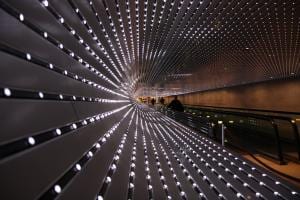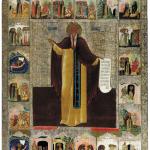
In many contemporary science fiction stories, as well as in some speculative scientific studies, the idea of alternative realities has been raised. These alternative realities are said to be similar to our own. They contain many of the same people, places and things in them. The difference lies in the choices which are made by the people in each reality. Different choices lead to the creation of different histories, and the more these choices differ, the more the different realities branch out, like a tree. Likewise, when talking about these alternative realities, each a particular universe, there is also the notion that these universes are all interconnected, that they form one great whole which is called the multiverse.
There is some semblance to various notions of the Kabbalah, where the Torah itself is said to have multiple interpretations, contradictory interpretations, which are all valid, depending upon which are actualized. If properly interpreted, the Torah can be used to predict a variety of possible futures, each which are valid, even if only one of them is actually realized. What ties them together is the Torah. And this is because the Torah itself is an expression and representation of all the meanings associated with the names of God.
The notion of the multiverse is highly controversial. Not everyone agrees with it, indeed, many scientists think it is entirely false. But this is because of its speculative nature. Some scientists are more concrete in their speculations, wanting more evidence than is usually offered by those who promote the notion of the multiverse. Nonetheless, there are elements coming out of scientific research (especially from those involved with quantum mechanics, where the notion of every quantum possibility is realized in some universe within the multiverse), which provide evidence in favor of the multiverse being real, especially when that evidence is examined and contemplated upon by someone who is willing to engage speculation.
Now, there are several questions which could be asked about the multiverse theory. From a Christian perspective, two of them are: what, exactly, are the theological ramifications of the multiverse theory, and can Christians hold to some version of a multiverse theory? As the topic of the multiverse is new, as the scientific research and study of the notion is relatively new, as there are many variations of the multiverse theory which can be brought up, it is difficult, if not impossible, at this stage to give definitive answers to these questions. What can be done is to speculate possible answers, leaving it open for more definitive responses to be given as the multiverse theory is explored more in scientific and in theological circles.
As there are a variety of ways people can understand the multiverse, the theological and philosophical ramifications for a multiverse will depend upon the qualities one attributes to the multiverse. What is also important for us is to explain what we mean by the term universe. If the universe is defined as all that exists, then a universe and a multiverse would be the same thing, but if a universe is seen as all that exists within a particular space-time continuum, allowing for a variety of space-time continuums to exist, then it is possible to call each alternative reality, with its own space-time continuum, a universe, and to say the multiverse is the holistic unity of all such universes. Each space-time continuum, each universe, can be said to be infinite in regards its own space while finding itself bounded and contained by the multiverse, similar to the way a line is infinite but finds itself contained within a plane. This is why even if a particular space-time continuum exists within an infinite universe, this would not mean that such a universe could not exist within a multiverse.
A universe within the multiverse theory is thus an integrated space-time continuum, with boundaries or limits, and beyond those boundaries then can be found other space-time continuums, other universes. Just as it is possible for a believer to believe God created multiple words full of intelligent life, God likewise can create multiple universes. He can integrate them, if he likes, or have them relatively independent (they would still be united together as one in the sense that they all share the fact that they are created by the same source, God). This, at least, should be something that Christians can agree. They do not have to assert that God actually created a multiverse, but that it is possible for him to do so if he chose to do so. If they deny this possibility, it suffers from the same errors associated with Étienne Tempier’s condemnation in 1277 of those scholastics who said God could only make one world.
Perhaps the most troubling idea of a multiverse is the one in which every quantum possibility will be actualized in its own particular universe This is because it seems to turn creation, and the freedom given to creation, as well as the freedom of God himself, inside-out. Why? Because it suggests that every possible reality, every possible contingent existence must exist, which would mean, contingency would also be necessity. But the notion of possibility relies upon the qualification that what is possible is possible not to be, but if every possibility exists, then it suggests that there really is no possibility which also remains unactualized. Freedom, however, gives those with such freedom the ability to engage possibility, to choose what to actualize and what not to actualize. This freedom would be lost to God because he would have to generate every potential universe in order to actualize all the possibilities of existence. God, then, would not be free. Likewise, free will can then be ultimately denied within creation itself, since all possible actions, all possible willed events would be actualized. For this reason, such a multiverse theory must be rejected. But this does not remove the possibility of a multiverse, and the establishment of many particular universes, based upon particular points in time and various different actions which could take place at those points in time that God uses to create a variety of realities. Since this other notion does not necessitate the realization of all potential universes, but rather the generation of various particular ones, based on God’s own decision of when to create such alternative realities, God’s freedom would not have to be denied, and so, along such lines of reasoning, its possibility remains acceptable.
But, even if not all potential universes are actualized, but one universe is able to be divided and turned into more than one is, there arises the question of what happens with the people who existed in one reality once it becomes divided into two or more distinct realities. Does this create multiple persons, multiple souls, each with their own eschatological destiny and end, or does the person in all realities remain somehow interconnected and form one whole together based upon all such realities they exist in?
Both possibilities hold some merit as well as some concern.
If we were to answer that there will be the creation of a plurality of persons after particular events spawn the creation of alternative realities, is this because those people were already together as one before the creation of those realities, or because a soul can somehow be divided up and create many other souls from itself? Both answers offer challenges. The first would raise the question of who and what is in charge when multiple souls work together as one, and whether or not all the souls share in the merits and demerits of their combined actions, or only those in charge would do so. The second answer, however, would raise questions about the nature of the soul itself, but on the other hand, would explain that the creation of alternative realities might be something given to the soul and is established when a soul divides itself into two or more (whether or not it knows it is doing so). In either case, the eschatological fate of every particular soul will depend upon its state at the end of its temporal existence, and so each soul can easily be judged without affecting the results of other souls.
The possibility that we are persons who exist in many different universal realities at once troubles us, and seems to be contradicted by the fact, that we are not aware of such other universes and other existences within our lives. Nonetheless, as we have come to recognize various aspects of our psyche remain outside of our own conscious awareness, this does not mean it is impossible for us to have different parts of ourselves living and acting unaware of what other parts of us do. Yet, this is not to say we would be totally unaware of such alternative existences being lived out by our souls. Perhaps the feeling of déjà vu could be explained by the fact that in some other reality, we lived through a similar sequence of events, and our unconscious connection to that other reality is manifesting itself to us. Theologically, we would have to deal with the soteriological ramifications of tis. What would salvation entail for those who exist and live out in a variety of universes at one time? Would it be the salvation of only particular parts of ourselves, that is, those parts of us who do what needs to be saved in their particular aspects of their meta-life? Or would every aspect of us, even those which do not cooperate with grace but resist it, be saved because of those parts of us which open up to salvation are tied together in one soul with such a meta-existence? And yet, not everything would be a challenge. Such a multiversal existence would help give hope that all will be saved, because it would suggest that even if we do not see someone act in accordance to salvation in a particular form of existence, this is not to say they do so in all forms of existence. Perhaps, even, this could be the cause for the development of many universes by God, so that everyone can find some particular universe in which they come to God and open themselves up to him to be saved. Nonetheless, it would seem, in an eschatology which accepts the existence of a variety of universes in which we live, our whole self would be consciously reintegrated, so that we would be aware of all we have done in all realities, or some if only some aspects of us are saved, allowing our true character to form as a result that combination instead of what is revealed in only one reality; what is lacking in one reality could be fulfilled in another, so that in that reintegration, we will find satisfaction not only in our eternal life, but in our temporal existence as well.
Christians can hold to some form of multiverse theory, so long as they continue to affirm basic Christian theological doctrines. What is important is the realization of freedom, to make such a multiverse theory does not override freedom, either in God, or in his creatures. Likewise, it is important to recognize, if some form of multiverse theory is true, it raises questions concerning who we are, questions which we might not be able to answer and will not know the answer until we experience eternal existence, when we transcend temporality and so will know and realize what is contained in all forms of temporality.
Stay in touch! Like A Little Bit of Nothing on Facebook.
If you liked what you read, please consider sharing it with your friends and family!













